- Home
- Lin Carter
Thongor in the City of Magicians Page 2
Thongor in the City of Magicians Read online
Page 2
Long did he ponder the words of the old wizard. The east was crimson with dawn ere he turned away and sealed again that secret cavern of treasure, and reascended the spiral stair.
CHAPTER 2
HARNESSING A THUNDERBOLT
The Wizard warned of evil Zaar,
And in weird prophecy foretells
A jewel-weapon, like a star,
Wherein the force of lightning dwells.
—Thongor’s Saga, XVII, 4.
North of Patanga’s central plaza, a small square called the Forum of Numidon lies near the River Gate. Thereon stands a tall house of yellow stone with a roof of red tiles, the home of Iothondus of Kathool, a young philosopher and student of nature. And thither with midmorning rode Thongor the king and a party of his nobles.
Long had he pondered the deep words of the old book, and returning to the Palace of Sarks to share the morning meal with Sumia his mate and young Prince Tharth their son, now six years old, he was now ridden forth to consult with the youthful sage. In his dream or vision of the previous night, the gods had spoken of “the Crystals of Power.” Thongor was reminded of that time five years before when he had fought and ventured on the Rmoahal plains of the remotest East. He recalled the shaman Tengri and his enchanter’s staff, tipped with a glowing gem whose merest touch drained the strength from a man’s body with a numbing shock. This mystery gem he had cut from the shaman’s rod and fetched back to Patanga as a curiosity. The gem he had later given to Iothondus for study. And Iothondus had told him that among the Wise it was called a sithurl . . . a power-crystal.
Thus did he ride forth with mid-morn, to see if the keen wits and broad lore of the young philosopher could unravel this riddle of the gods. The sun stood near to the zenith; the day was bright and hot. Mounted on swift-pacing kroters, Thongor and his comrades left the palace grounds by the rear gate and took the avenue called The King’s Way through the Old Town quarter to the forum. With Thongor rode that bull-chested old warrior, the Lord Mael; fat, redfaced old Baron Selverus; elegant young Prince Dru, the daotar or commander of the Patangan Archers, and Zad Komis and Thom Pervis, daotars of the Black Dragons and the Air Guard.
Apprised of Thongor’s coming by a messenger, the sage met them at the gates of his house and greeted them as they dismounted, and led them within. Like all Lemurian houses in the Nine Cities of the West, his house was built in an open square about an atrium, or inner courtyard, which served as his place of study and a laboratory for his experiments wherewith he sought to delve deep into the secrets of nature.
His atrium was cool and shady, with striped canvas awnings as a shield to ward off the noontide sun. Long low iron tables with slabs of marble for tops stood about the walls, and thereon were set the implements of his researches, aludels and curcubits, crucibles and retorts and curious vessels of glass wherein strange fluids bubbled and seethed. Here and there stood massive athanors and wooden racks of books and papers. In one corner stood the skeleton of a man articulated with copper wire; on a porcelain bench, a human brain floated in a bath of clouded liquid.
That bluff and hearty old warrior, the Lord Mael, peered with distaste at the crowded shelves and cluttered tables: a man of war, he gave his trust only to his sword and his king, and liked not those matters of the intellect which savored to him of witchery and the evil arts.
His old companion, fat, red-faced Baron Selverus, waddled into the court, grumbling and snorting through his fierce bandit mustachios, bending a suspicious eye on the tall and massive athanors, or wizard’s furnaces, and the other paraphernalia of study. But the third peer of the realm, slim, dapper, foppish young Prince Dru, Sumia’s cousin, glanced with lively curiosity at the apparatus and riffled with interest through the old vellum-bound tomes and the parchments scrawled with uncouth hieroglyphics that littered the tables and the crowded shelves.
As for Zad Komis and Thom Pervis, they stood attentively while the quiet-voiced young sage spoke briefly with the king. Zad Komis, daotar of Thongor’s own veteran corps of hand-picked, seasoned warriors, the Black Dragons, had the silver-shot black hair and close-clipped grizzled beard of age, with the hard straight body of youth. In the glistening black leather harness of the Dragons, his great black cape thrust back over his lean shoulders, his bare brown body was that of a matchless fighting man.
Thom Pervis, daotar of the Air Guard, was stern and majestic as a stalking panther, keen-eyed and grey-maned, clad in the silver gilt harness of the aerial navy, with sparkling silver helm and voluminous blue cloak.
The young philosopher gained their attention.
“Belarba, sire, and my lords,” he welcomed them with the familiar Lemurian word of greeting. “I have long devoted study to the crystal and am ready to demonstrate its weird secrets, as the Sark-of-Sarks has desired of me.”
Iothondus drew from a locked cabinet the sithurl and set it upon a marble-topped table, together with certain objects. The power crystal was a gem about the size of a young boy’s fist. It was cut into flat facets and pierced through the axis with a narrow filament of copper which protruded from either face in two odd nodules which a person of our own later age might have recognized as electrodes. The crystal was dim and clouded, but within its heart a coiling mist of glittering sparks flickered eerily with flakes of green and silver fire. Mael and Baron Selverus regarded it uneasily, but the others closely examined the sithurl with great interest.
Iothondus, a quiet-faced, low-voiced young man, modest and sober of mien, clad in a robe of neutral gray, looked down at his glittering toy somberly.
“This much have I learned,” he said softly. “The sithurl, which is found only amidst the trackless plains of the distant east where the great warrior clans of the Rmoahal nomads wander and rule, has a property unknown to any other substance in all of Nature. Alone, this crystal absorbs and stores within it the light of the sun. This the sithurl draws in and filters through its crystalline structure, transmuting it into an energy akin to the fury of the lightning, and storing this new force between the planes of its structure. I cannot say how the heat of the sun is changed into the tingling force of the thunderbolt, but thus it is. Perhaps it is even as the ancient philosopher of nature, wise Quonidus of Yb, said of old: all energies are different forms of one primal force, heat, light, fire, and the levin-bolts of heaven.”
His low, thoughtful voice droned on, enumerating the rare properties and powers of the sithurl.
One of our modern age, could he have overheard this discussion, might have guessed that the power crystal was somewhat akin to the galena or corundum crystals used in the “crystal sets” popular in the early, experimental days of radio—heavy mineral crystals of lead sulphide whose unique quality is to permit an alternating current to pass freely in one direction only. Or perhaps the sithurls were similar in nature to an allotropic crystalline form of some photosensitive energy-absorbing metal such as selenium. The secret can no longer be discovered, nor the nature of the lost power crystals of the Lemurian Adepts determined with any accuracy. The last known true sithurl vanished from the knowledge of man in history’s dawn with the destruction of Atlantis.
“The Sark-of-Sarks hath told me the tale of Jomdath of the Jegga Nomads, who said that when the shaman’s rod tipped with this crystal but touched his body he was paralyzed with a strange numbing force. The force is not strange: I have seen a ship’s mast struck with lightning, and men caught in the nimbus of the thunderbolt were prostrated, numbed, rendered weak and helpless with the tingling force of the bolt. Thus it is with this sithurl. The force, released in a certain way, delivers a weak trickle of energy which paralyzes the nerves. Released in other ways, the results are more . . . spectacular, ” the young philosopher said.
“How is this done?” Thongor inquired, peering at the mystic jewel with a curious gleam in his strange golden eyes.
“This metal rod which transfixes the crystal along the axis of its structure is the key to altering and controlling the flow of the forces stored w
ithin the crystal,” he explained. “Also, the precise shape and number of the facets, as related to the plane of the crystalline structure, and the adjustments of these nodules, serve to influence the release of the forces locked within the sithurl.”
The sage made a slight adjustment at the base of the metal bracket wherein the crystal was set, and placed it on one end of a long low table of porcelain which had been cleared of all other clutter. At the other end, he placed a wood vise, clamping upright therein a dagger with the steel blade pointing into the air.
“I have experimented with different settings, and learned how to release the inner forces at different intensities,” he said.
Prince Dru eyed the apparatus dubiously. “You said the results could be ‘spectacular’?”
The philosopher nodded. “Depending on the size of the crystal used, and the length of time it is exposed to the direct rays of the sun, the results can indeed be spectacular,” he answered smiling. “Behold!”
He made one last adjustment—
KRAKKK!
A searing bolt of green-white fire clove the shadowy dimness with blinding brilliance. The stench of ozone assailed their nostrils. The dagger’s blade glowed cherry red—then fierce yellow—then sagged and folded to run over the top of the table in sizzling driblets of molten metal.
The solid steel blade was gone, leaving naught but a bent stub of blisteringly hot metal behind, standing in a cooling puddle of liquid steel.
Spectacular . . . indeed!
“Gorm!” Thongor growled, nape-hairs bristling with the barbarian’s inborn dread of the supernatural.
“Witchery! Evil witchery,” fat old Selverus boomed, and clutched the protective amulet of green paste which hung on a leathern thong about his red neck.
The others stared, frozen with astonishment, blinking against the after-images of that searing bolt.
“Or . . . behold!” the sage said, making another adjustment at the base of the astounding gem. Its greenish-silver inner radiance grew slowly brighter . . . a clear, soft, unearthly blaze of light that illuminated the awning-shaded court as brilliantly as a miniature sun!
“Heaven’s lightning, and heaven’s sun, combined in one magic gem,” Zad Komis mused, rubbing his trim spade-beard thoughtfully.
Thongor recalled a scrap of prophetic lore he had read the night before from the mighty Grimoire of Sharajsha. He repeated it aloud. “ ‘The power of future ages lies locked in the crystals of the unknown East, the power to light the cities of man, or to crush them into dust. . . ”
Young Iothondus nodded.
The blazing radiance that glimmered like a halo about the sithurl waned . . . faded . . . and was gone.
“Thus it is, with this particular specimen,” he commented. “Its capacity to retain in storage the sun’s energies is very limited. A larger or purer crystal could emit a more powerful destructive bolt, or a steady illuminance that would last for hours. . . His voice grew dreamy, his scholar’s pale face wistful. “There is now given unto us a tremendous secret, which can be used for man’s good or for man’s ill. With this wisdom, we could light the streets and the houses of our cities through the hours of darkness, that no man need fear the dark, the assassin in the shadows, the thief in the night. Or, by a simple adjustment of the faceting, a flow of sun-like heat, to stave off the cruel grip of icy winter . . . or. . . .”
“Or this power could be bent to the needs of war,” Thom Pervis completed the philosopher’s thought for him, in his deep thoughtful voice.
“Aye, my lord, there is that. And I fear that war shall be the first purpose to which we must employ the sithurl,” Thongor growled, face grim. He had spoken to none of the warning the gods had delivered to him in his dreams the night before, not to his mate Sumia nor to these, the peers and commanders of his empire. But the words of Heaven lay like heavy stones in his mind.
He turned abruptly to the sage.
“You have found the key to releasing the forces locked with these power crystals,” he said. “Would you know how to cut and cleave more of these crystals, to deliver stronger bolts of the lightning force? If we were to mount the sithurls in our airboats, could they blast objects from a greater distance?”
Iothondus nodded. “Aye, sire. Given crystals five or six times the size of this, my only specimen, I could cut them for that use in only days—”
“Then you shall have them, by Gorm! And should the dark wizards of Zaar strike against us, we shall defend ourselves with the very thunderbolts of heaven!”
“I would welcome the chance to experiment with new stones,” said Iothondus; “and to explore the nature and potentials of this new force. All I need is a sizable quantity of new crystals. I can readily adapt them to distance-weapons, and I perceive a method by which I can affix them to tripod-mounts in the prow of the Air Guard’s floaters and yet trigger their destructive bolts from the floaters’ cabins.” Lord Mael cocked a mirthful eye at the quiet sage. “How now, my lad? A moment gone and you were bemoaning the use of the gems for warfare—now you are busy with plans for their use as weapons! How do you reconcile your ethics with the practical use of warriors?”
The philosopher smiled gently. “I am a student and a man of peace, no warrior. Yet am I wise enough, my lord, to know that a man can only practice the arts of peace and science in a realm powerful enough to defy and overcome its enemies! In strength there is peace, and will ever be, until men are wise and noble as the very gods—which shall not be in our time, I fear! Hence is the profession of the warrior a proud and noble one, to be served and honored by those of us who may not bear the sword. Hence do I know that in such times, and in the world as it is, the needs of war must be served, if men of peace and philosophy such as I may be free to pursue our studies,” said Iothondus who, although young in years, was among the wisest of the Wise in his mighty epoch.
Lord Mael beamed and swaggered to the sage’s side, and clapped one beefy hand to his frail slim shoulder—a blow which staggered the smiling young man.
“Well said, my lad! Aye, and truthful words of wisdom, too—I like your spirit, boy!” Mael boomed heartily as the others grinned.
Thongor moodily stared at the glowing enigma of the small crystal. . . the tiny, insignificant bit of stone that was to change the face of the earth and alter the course of future ages. Then his mood turned, and the zest of adventure filled his veins like heady wine. To venture again into the unknown vastness of the eastern plains! To seize a mighty weapon for defense against grim-walled Zaar, within the very shadow of her ebon walls! His deep voice rang out like a trumpet, summoning men to war.
“Thom Pervis! Ready a score of your largest, most capacious airboats for immediate departure to the lands of the Jegga Horde. Place your most experienced pilots on the alert—we voyage east as soon as all can be prepared.”
“Aye, Lord King!”
“And you, Zad Komis, command a picked company of the Black Dragons to stand by for boarding the fleet. Gorm alone knows what adventures and perils lie in wait for us as the world’s edge!”
And thus it was begun . . . the Last Battle, wherein time and the gods should weigh the strength of Patanga against the evil science of Zaar, that one should fall, but the other—rise!
CHAPTER 3
SAILORS OF THE SKY
To guard the kingdom Thongor rules,
His fleet must venture to those lands
Wherein are found the magic jewels
And where the Druids’ city stands.
As bright keels clove the morning air.
They soar aloft and speed away—
East, ever east, they flew—for there
The secrets of the Future lay!
—Thongor’s Saga, XVII, 5-6.
Dawn burned crimson and gold in the east. A fresh salt breeze blew from the gulf, tugging at Thongor’s vast cloak and stirring the gold-and-black banners along the roof’s edge into life. Two days of busy preparation had passed, and the expedition into the unknown east was
ready to depart. Dawn-light sparkled on the silvery hulls of the air-boats as they circled above the Palace of Sarks, awaiting Thongor.
On the rooftop landing-stage above the palace, the Valkarthan made his farewells to his princess and his son, the young prince. Young Tharth, or Thar, as they called him, was a sturdy, husky lad of six, tanned and lithe and sinewy, with the coarse black mane, scowling brows and strange golden eyes of his mighty sire. Thongor bent and scooped the boy up, tossing him into the air and catching him as the boy crowed with laughter—then handed him into the keeping of Lady Inneld and Lady Lulera, the two daughters of Lord Mael who served as handmaidens to Princess Sumia.
Then he turned and drew his lovely dark-eyed mate into the embrace of his brawny arms. He strained her against his chest, crushing her softness against his strength, and gave her warm lips a resounding kiss that left her gasping breathlessly.
“Fear not for me,” he said gently. “We but venture to the lands ruled by our friend Jomdath, the old chief of the Jegga Horde. We shall secure a load of the power crystals and return to Patanga straightway.”
Sumia smiled and kissed him by way of answer. A warrior’s mate in a barbaric age, she knew his life was set about with danger and peril. Although her woman’s heart ached at the thought of letting the man she loved dare a thousand hazards half a world from her side, she said no word against his going. A brave man must do battle with his foes, or fall beneath them. She would have it no other way.
They clung together in a last embrace, and then he turned away to salute the others who had come to the rooftop landing-stage to make their farewells—Lord Mael and Baron Selverus, Prince Dru and Iothondus the philosopher, Zad Komis of the Black Dragons, in whose hands the command of the City of the Flame lay during Thongor’s absence, and wise old Eodrym, Hierarch of the Temple of Nineteen Gods.

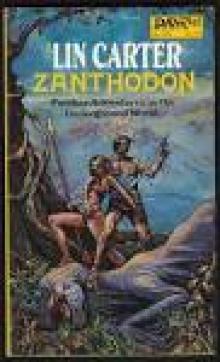 Zanthodon
Zanthodon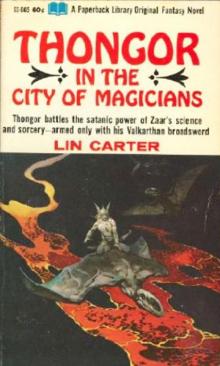 Thongor in the City of Magicians
Thongor in the City of Magicians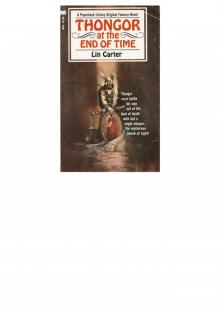 Thongor at the End of Time
Thongor at the End of Time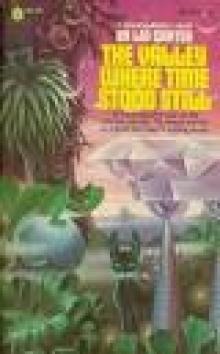 The Valley Where Time Stood Still
The Valley Where Time Stood Still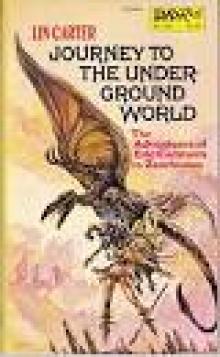 Journey To The Underground World
Journey To The Underground World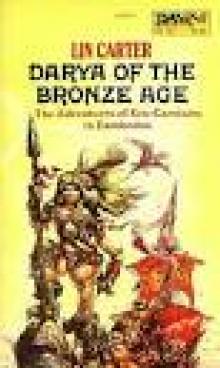 Darya of The Bronze Age
Darya of The Bronze Age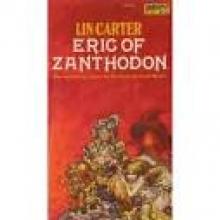 Eric of Zanthodon
Eric of Zanthodon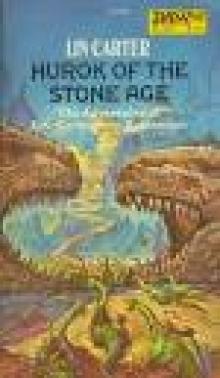 Hurok Of The Stone Age
Hurok Of The Stone Age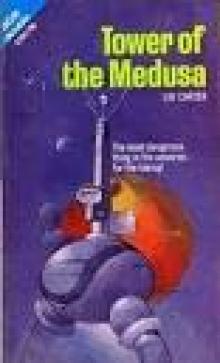 Tower Of The Medusa
Tower Of The Medusa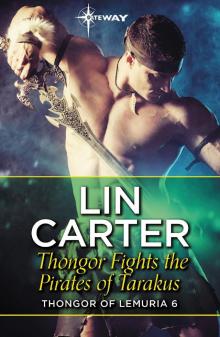 Thongor Fights the Pirates of Tarakus
Thongor Fights the Pirates of Tarakus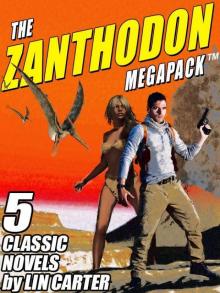 The Zanthodon MEGAPACK ™: The Complete 5-Book Series
The Zanthodon MEGAPACK ™: The Complete 5-Book Series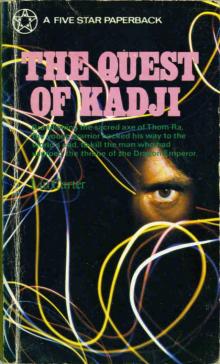 The Quest of Kadji
The Quest of Kadji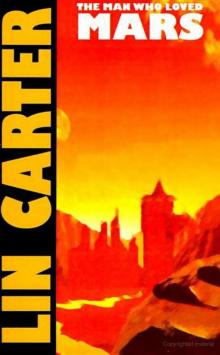 Lin Carter - The Man Who Loved Mars
Lin Carter - The Man Who Loved Mars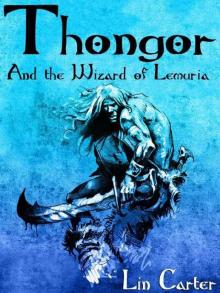 Thongor and the Wizard of Lemuria
Thongor and the Wizard of Lemuria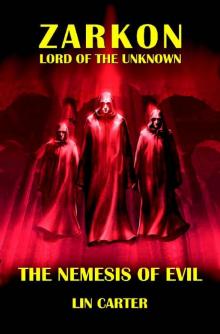 The Nemesis of Evil
The Nemesis of Evil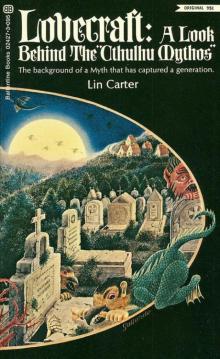 H.P.Lovecraft: A Look Behind Cthulhu Mythos
H.P.Lovecraft: A Look Behind Cthulhu Mythos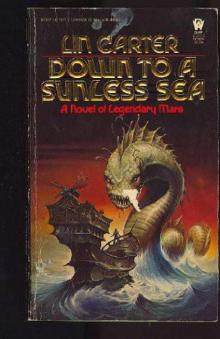 Lin Carter - Down to a Sunless Sea
Lin Carter - Down to a Sunless Sea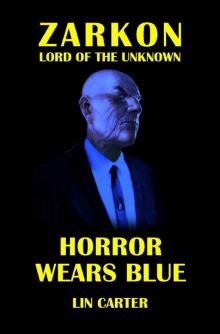 Horror Wears Blue
Horror Wears Blue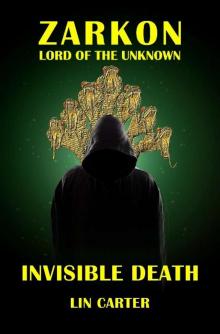 Invisible Death
Invisible Death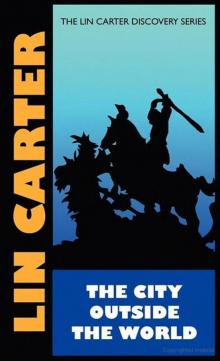 Lin Carter - The City Outside the World
Lin Carter - The City Outside the World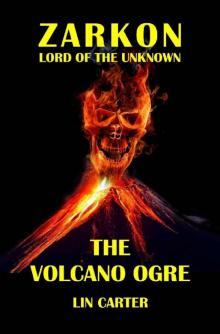 The Volcano Ogre
The Volcano Ogre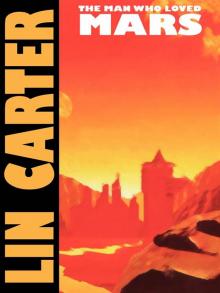 The Man Who Loved Mars
The Man Who Loved Mars